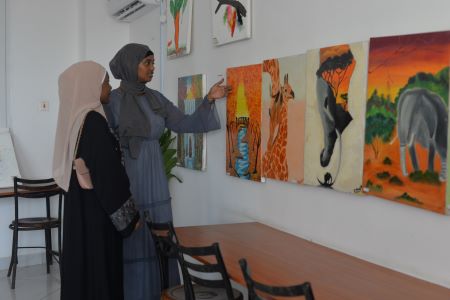Yahuza Bawage
It was a sweltering Wednesday in February 2024. Salome Lenshie was engrossed in her latest project – transforming a client’s single room and bathroom with a fresh painting design.
Painting wasn’t always Lenshie’s intended path. In 2019, she hired a professional to decorate her room, but learned lathat she couldn’t afford the fees he charged. Undeterred, she decided to tackle the project herself.
“I turned to YouTube, searching for tutorials on room painting. Satisfied with the practical steps, I went ahead and bought paint and tools, and decorated my room with a beautiful design,” Lenshie recalled.
Across Jalingo, northeastern Nigeria, on that same scorching afternoon, Ediseh Hamisu Daniel hurried amidst the bustling corridors of the Taraba State University campus to hop on a tricycle that would transport her to Mile-six, where she would join forces with her boss to complete a painting project they started the previous day.
Unlike Lenshie, Daniel’s artistic journey began with a different medium. During a 2018 adventure trip to Bauchi, she discovered the art of making calabashes used in traditional festivals and weddings, and Daniel would soon pique interest in the craft.
“I learned how to craft and decorate these beautiful calabashes. Here in northern Nigeria, they are adorned with beautiful painting designs to serve as decorations during ceremonies,” Daniel said.
On returning to Jalingo, Daniel temporarily set aside her calabash work until 2022. That year, she met a friend, who was already involved in painting and wall design. After realizing that she has a knack for his stint, the friend encouraged her to learn the skill. Daniel quickly joined him as an apprentice and it set a new dawn in her pursuit of a vibrant world of artistic creation.
Facing barriers
Lenshie and Daniel, have both encountered gender-based discrimination, often facing dismissive comments from their communities who view their work as a male-dominated profession.
Their journeys are far from easy.
“I have been confronting discrimination from people advising me to go and do domestic chores instead of painting,” Lenshie stated.
Daniel recalled that “Once at the site, people will stop and look at me. They will be saying that as a woman, I shouldn’t fit into this kind of work.”
The physical demands of the work have also proved to be challenging. From lifting heavy materials, working long hours under harsh conditions, and navigating dangerous environments are realities Lenshie and Daniel face daily.
But, the problem is made worse because there aren’t enough facilities and equipment that include everyone. Tools made for the average man can be difficult or unsafe for women, making it harder for them to work efficiently and safely.
Supportive networks
When Lenshie initially shared with her friends that she painted her room, many among them doubted her skills. But as her parents and siblings recognized the craft as one that is breaking gender stereotypes, they gave their blessings.
“Their support was unwavering. In fact, they even connected me with my first paid gig, which was an opportunity to paint a client’s room for N8,000,” Lenshie explained.
For Daniel, she quietly honed her painting skills on the sly for over a month. One evening, after a challenging day at work, she convinced her boss to capture pictures that she later shared on her Facebook page.
“There were amazing reactions. Some of my Facebook friends supported it. While some felt as a female, I shouldn’t be doing it, but I choose to focus on the positive vibes, paying their words no attention,” Daniel said.

From a hijabi mechanic in Abuja to a barber wielding her clippers in Kwara, and a young disc jockey finding her rhythm in Taraba, all across Nigeria – Lenshie and Daniel’s stories are just fractions of stories of African women defying societal expectations and carving their paths to success in fields traditionally dominated by men.
A gender equality advocate, Aisha Dahiru, emphasizes the immense potential that lies in allowing individuals to pursue their passions and talents regardless of their gender.
“I always admire the resilience of women challenging the harmful stereotypes that often push them out of male-dominated professions. There is a need for supportive networks, both personal and professional, that will encourage and empower women to thrive in these fields,” Dahiru stated.
Going forward
Despite juggling a painting career alongside wedding decorations, hairstyling, and filmmaking, Lenshie remains committed to delivering exceptional designs that meet her clients’ desires.
As an undergraduate student pursuing a degree in Biotechnology at the Taraba State University, Daniel is struggling to balance her painting work with her academics. Regardless, she is determined to excel in both pursuits.
Currently, Lenshie mentors three young individuals, including friends and siblings, yet she is nurturing a simple dream.
“I dreamed of having a paint and design company that is fully equipped with modern machinery, so I could recruit more young people into the industry,” Lenshie affirmed.
Daniel, on the other hand, envisions honing her skills to a higher level. “I expect to witness more progress in my craft and opportunities that will allow me to implement big painting and wall design projects,” she stated.
Today, Lenshie and Daniel hope to inspire young females across the Sub-Saharan soil, encouraging them to challenge social norms and shatter gender stereotypes, one step at a time.





Wow , thanks for showcasing us to the world ,I really appreciate
I am very grateful for this opportunity I have to be a painter. Thank you very much yahuza,